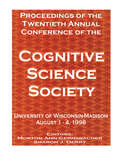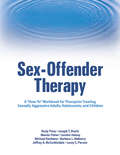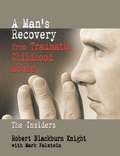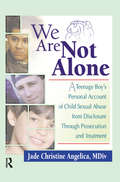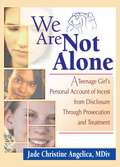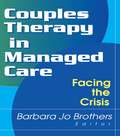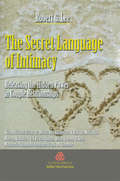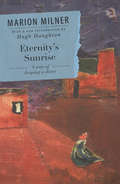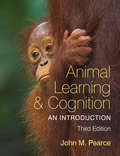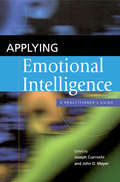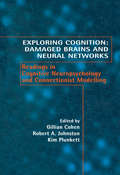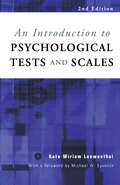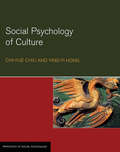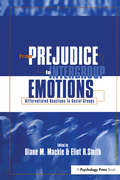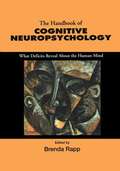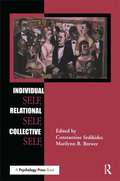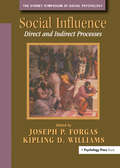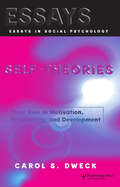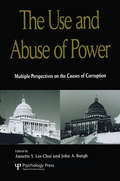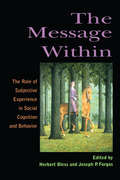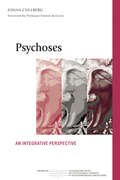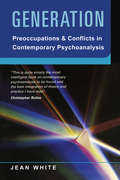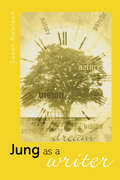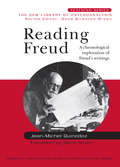- Table View
- List View
Proceedings of the Twentieth Annual Conference of the Cognitive Science Society
by Morton Ann Gernsbacher; Sharon J. DerryThis volume features the complete text of the material presented at the Twentieth Annual Conference of the Cognitive Science Society. As in previous years, the symposium included an interesting mixture of papers on many topics from researchers with diverse backgrounds and different goals, presenting a multifaceted view of cognitive science. This volume contains papers, posters, and summaries of symposia presented at the leading conference that brings cognitive scientists together to discuss issues of theoretical and applied concern. Submitted presentations are represented in these proceedings as "long papers" (those presented as spoken presentations and "full posters" at the conference) and "short papers" (those presented as "abstract posters" by members of the Cognitive Science Society).
Sex-Offender Therapy: A "How-To" Workbook for Therapists Treating Sexually Aggressive Adults, Adolescents, and Children
by Rudy Flora Joseph T. Duehl Wanda Fisher Sandra Halsey Michael Keohane Barbara L. Maberry Jeffrey A. McCorkindale Leroy C. ParsonGroundbreaking information for treating sex offenders Sexual abuse, sexual addiction, and sexual offending have become a significant clinical problem. Successfully treating these disorders is the first step toward preventing future victims. Sex-Offender Therapy is a practical workbook for clinicians who deal with sexually aggressive adults, adolescents, and children. This invaluable professional resource focuses on how to treat patients—male and female—impaired by sexual addiction, sexual disorders, sex offending, and other sexual misconduct behaviors. Designed as an accessible step-by-step guide, Sex-Offender Therapy features case studies, work exercises, and clinical suggestions that help to walk the reader through a sexual disorders program. With a wealth of therapeutic interventions, as well as information on polygraph testing and the FDA-approved plethysmograph, this unique text breaks new ground. Additionally, this detailed volume not only presents clinical definitions of all the sexual disorders but goes beyond patient features and evaluation to look at useable, concrete methods for lasting treatment. Topics discussed in Sex-Offender Therapy include: problems, stress, and boundary setting transference and countertransference sexual recovery therapy and its techniques acknowledgement and responsibility the stand-up presentation and victim empathy cycles of offending using the four phases as a relapse prevention format working with the difficult offender trauma in adult, adolescent, and child offenders the cost of offending antisocial disordered patients triggers clinical interviewing and report writing adult and juvenile psychosexual evaluations polygraph testing treatment of sexually aggressive youths defense behaviors group therapy and many more!Informative, practical, and user-friendly, Sex-Offender Therapy is a vital resource for patients and their families, beginning or advanced therapists, attorneys, criminal justice personnel, human service caseworkers, judges, law enforcement, legislators, probation officers, prosecutors, educators, students, researchers, and mental health professionals.
A Man's Recovery from Traumatic Childhood Abuse: The Insiders
by Robert Blackburn Knight Mark FalsteinFirst published in 2002. Routledge is an imprint of Taylor & Francis, an informa company.
We Are Not Alone: A Teenage Boy's Personal Account of Child Sexual Abuse from Disclosure Through Prosecution and Treat
by Jade Christine AngelicaAny teenage boy who discloses sexual abuse is facing an emotional ordeal. However, the workbook We Are Not Alone: A Teenage Boy&’s Personal Account of Child Sexual Abuse from Disclosure Through Prosecution and Treatment can help him understand and endure the process. As it tells the first-person story of Joe, whose neighbor molested him, it offers an opportunity to discuss emotional issues, learn the facts of the process, and gain the sense of solidarity and support so crucial to the recovery of abused children. This helpful book deals with gender-specific issues as well as the universal problems of any sexually traumatized teenager. We Are Not Alone: A Guidebook for Helping Professionals and Parents Supporting Adolescent Victims of Sexual Abuse is also available as a companion volume for therapists, teachers, legal and law enforcement professionals, and parents of the victim.
We Are Not Alone: A Teenage Girl's Personal Account of Incest from Disclosure Through Prosecution and Treatment
by Jade Christine AngelicaThis step-by-step guide is designed to help sexually abused teenage girls through the legal and emotional processes of dealing with what has been done to them. We Are Not Alone: A Teenage Girl's Personal Account of Incest from Disclosure Through Prosecution and Treatment tells the first-person story of Jane, whose father molested her. It addresses emotional issues, clarifies the legal process, and helps readers understand their reactions to abuse. This helpful book can help readers gain the strength they need to heal from the confusion, loneliness, and shame of having been the victim of a sexual predator. We Are Not Alone: A Guidebook for Helping Professionals and Parents Supporting Adolescent Victims of Sexual Abuse is also available as a companion volume for therapists, teachers, legal and law enforcement professionals, and parents of the victim.
Couples Therapy in Managed Care: Facing the Crisis (Journal Of Couples Therapy Ser. #Vol. 8, Nos. 3/4)
by Barbara Jo BrothersCouples Therapy in Managed Care: Facing the Crisis provides social workers, psychologists, and counselors with an overview of the negative effects of the managed care industry on the quality of mental health care. Within this book, you will discover the paradoxes that occur with the mixing of business principals and service principles and find valuable suggestions on how you can creatively cope within the managed care context. With Couples Therapy in Managed Care, you will learn how you can remain true to your own integrity and offer quality services within the current context of today's health care system. Current and comprehensive, Couples Therapy in Managed Care will assist you in easing the dilemma of patients who are suffering from serious physical illness or emotional pain and have little choice or time to search for a needed doctor or service. Couples Therapy in Managed Care offers you informative tips and suggestions on how you can help your clients within the constraints of the managed care system, such as: exploring ways to hold true to your personal values and the integrity of your personal approach to therapy while developing creative strategies to survive within managed care understanding the need to write a treatment plan using high professional standards and a solid theoretical analysis of the proposed therapy to give you a better chance of getting the managed care case manager to authorize your treatments realizing that maintaining a good working relationship with individual case managers will help you get more of your proposed treatments authorized, although their high rate of turnover makes this a daunting task discovering that a sometimes a solution to your problem may be as simple as a phone call to a case manager to negotiate an exception to a standard procedure Couples Therapy in Managed Care offers you effective suggestions to help you overcome the limitations you may encounter while trying to practice within a managed care setting. Innovative and informative, this book will help you provide your patients with the best possible therapy while offering you ways to decrease the stress that managed care systems can cause you and your clients.
The Secret Language of Intimacy: Releasing the Hidden Power in Couple Relationships
by Robert LeeIn The Secret Language of Intimacy, shame and its consequences are foregrounded as a major, if not the major, impediment to the healthy functioning in the relationships of couples. In the first part of the book, Robert Lee presents the "Secret Language of Intimacy Workshop," developed and presented for the first time at the 1998 Annual Conference of the Association for the Advancement of Gestalt Therapy. Lee not only describes how the hidden forces of shame and belonging regulate couple dynamics, but also how the workshop itself has facilitated the acceptance of these forces and promoted therapeutic resolution, utilizing clinical vignettes. The second half of the book is comprised of internationally contributed essays from leading names in the Gestalt perspective, each adding to and redefining the role of shame and belonging in the theory and practice of Gestalt couples therapy. Their conclusions, however, are just as insightful for purveyors of other psychoanalytic and psychodynamic therapies as well.
Marion Milner
by Marion MilnerIn this series, Emma Letley has worked with the Marion Milner estate to re-contextualise six classic volumes by arranging for experts to provide new scholarly introductions to each book. This six volume pack comprises: The Hands of the Living God On Not being Able to Paint Eternity's Sunrise A Life of One's Own An Experiment in Leisure. Bothered by Alligators These volumes will be useful and relevant to seasoned analysts as well as those new to Milner's work, making them attractive to a whole new generation of readers from both inside and outside of the psychotherapy profession.
Animal Learning and Cognition: An Introduction
by John M. PearceAnimal Learning and Cognition: An Introduction provides an up-to-date review of the principal findings from more than a century of research into animal intelligence. This new edition has been expanded to take account of the many exciting developments that have occurred over the last ten years. The book opens with a historical survey of the methods that have been used to study animal intelligence, and follows by summarizing the contribution made by learning processes to intelligent behavior. Topics include Pavlovian and instrumental conditioning, discrimination learning, and categorization. The remainder of the book focuses on animal cognition and covers such topics as memory, navigation, social learning, language and communication, and knowledge representation. Expanded areas include extinction (to which an entire chapter is now devoted), navigation in insects, episodic memory in birds, imitation in birds and primates, and the debate about whether primates are aware of mental states in themselves and others. Issues raised throughout the book are reviewed in a concluding chapter that examines how intelligence is distributed throughout the animal kingdom. The broad spectrum of topics covered in this book ensures that it will be of interest to students of psychology, biology, zoology, and neuroscience. Since very little background knowledge is required, the book will be of equal value to anyone simply interested in either animal intelligence, or the animal origins of human intelligence. This textbook is accompanied by online instructor resources which are free of charge to departments who adopt this book as their text. They include chapter-by-chapter lecture slides, an interactive chapter-by-chapter multiple-choice question test bank, and multiple-choice questions in paper and pen format.
Applying Emotional Intelligence: A Practitioner's Guide
by Joseph Ciarrochi John D. MayerThe explosion of research on emotional intelligence (EI) in the past decade has provided increasing evidence that EI can be measured reliably and can be useful in predicting important outcomes, such as managerial effectiveness and relationship quality. Naturally, people are now asking, "So, how does one improve EI?". Applying Emotional Intelligence collects the most important programs focused on that idea, and enquires of their originators, "What do you do?", "Why do you do it?", and, "What is the evidence for your approach?". The emphasis of the book is applied, in that it provides and contrasts concrete examples of what we do in our interventions in a wide variety of situations. The chapters present descriptions of programs, including specific activities and exercises that influence emotional knowledge and social effectiveness more generally. While practical in its focus, this book also discusses the theoretical bases for these approaches. These are new programs with outcomes that are now beginning to be studied. The book presents the most important and recent research findings that examine the efficacy of these programs. Applying Emotional Intelligence is a "must-read" for anyone interested in EI and its application. This book will be of interest to researchers conducting EI intervention research, as well as a wide variety of practitioners, including those interested in developing EI in organizations, health areas, clinical populations, and school-age settings. Finally, the book is designed to be relevant to the reader's own life, encouraging the reader to consider how the programs and the exercises might impact his or her personality and outlook, as well as contribute to the development of those who have themselves participated in the programs.
Attention, Genes and ADHD
by Florence Levy; David A. HayThis book focuses on the application of behaviour genetic approaches to twin studies, and reviews diagnostic to Attention Deficit Hyperactivity Disorder (ADHD), the relationships between reading, spelling and ADHD, and family and genetic influences on speech and speech and language.
Exploring Cognition: Readings in Cognitive Neuropsychology and Connectionist Modelling
by Gillian Cohen Robert A. Johnston Kim PlunkettExploring Cognition: Damaged Brains and Neural Networks analyses the contribution made by cognitive neuropsychology and connectionist modelling to theoretical explanations of cognitive processes. Bringing together evidence from both damaged brains and neural networks, this exciting and innovative approach leads to re-evaluation of traditional theories: connectionist models lesioned to mimic the residual function of the damaged brain and rehabilitated to simulate the process of recovery suggest underlying mechanisms and challenge previous interpretations.In this reader key articles by leading international researchers are combined with linking commentaries that provide a context, highlight the conceptual themes and evaluate the evidence. Carefully selected to include hotly debated topics, the papers cover, among others, the controversies surrounding explanations for category specificity in object recognition and for covert recognition of faces and words; the mechanisms underlying the use of regular and irregular past tenses; and the reading of regularly and irregularly spelled words. The challenges posed by connectionist models to assumptions about the nature of dissociations, the need for symbolic rule-based operations in language processing and the modularity and localisation of processes are assessed.Exploring Cognition: Damaged Brains and Neural Networks will be of interest to advanced undergraduates, postgraduates and researchers in cognitive neuropsychology and cognitive neuroscience.
An Introduction to Psychological Tests and Scales
by Kate Loewenthal Christopher Alan LewisIn its first edition this book successfully enabled readers, with little or no prior knowledge of computing or statistics, to develop reliable and valid tests and scales for assessment or research purposes. In this edition, the author has thoroughly updated the text to include new recent advances in computer software and provide information on relevant internet resources. The book contains detailed guidelines for locating and constructing psychological measures, including descriptions of popular psychological measures and step-by-step instructions for composing a measure, entering data and computing reliability and validity of test results. Advanced techniques such as factor analysis, analysis of covariance and multiple regression analysis are presented for the beginner.An Introduction to Psychological Tests and Scales provides a clear, concise and jargon-free primer for all those embarking in fieldwork or research analysis. It will be an invaluable tool for undergraduates and postgraduates in psychology and a useful text for students and professionals in related disciplines.
Social Psychology of Culture (Principles of Social Psychology)
by Chi-Yue Chiu Ying-Yi HongAs the speed of globalization accelerates, world cultures are more closely connected to each other than ever before. But what exactly is culture? It seems to be involved in all psychological processes, but can its psychological consequences be studied scientifically? How can cultural differences be described without reifying culture and reinforcing cultural stereotypes? Culture and mind constitute each other, but how? Why do humans need culture? How did the evolution of the mind enable the development of human culture? How does participation in culture transform the mind, and how does the mind process and apply culture? How may culture become a resource for pursuing valued goals, and how does culture become part of the self? How do culture travelers navigate cultures and negotiate multiple cultural identities? The authors of this volume offer a refreshing theoretical perspective and organize seemingly disparate research evidence into a coherent body of psychological knowledge. With its accessible language and lively narrative, this volume engages its readers in an intellectual journey through the fascinating research literatures in psychology, anthropology, and the cognate disciplines. This book will make an ideal textbook for senior undergraduate and graduate courses on psychology and culture, cultural studies, cognitive anthropology, and intercultural communication.
From Prejudice to Intergroup Emotions: Differentiated Reactions to Social Groups
by Diane M. Mackie Eliot R. SmithThe theories or programs of research described in the chapters of this book move beyond the traditional evaluation model of prejudice, drawing on a broad range of theoretical ancestry to develop models of why, when, and how differentiated reactions to groups arise, and what their consequences might be. The chapters have in common a re-focusing of interest on emotion as a theoretical base for understanding differentiated reactions to, and differentiated behaviors toward, social groups. The contributions also share a focus on specific interactional and structural relations among groups as a source of these differentiated emotional reactions. The chapters in the volume thus reflect a theoretical shift from an earlier emphasis on knowledge about ingroups and outgroups to a new perspective on prejudice in which socially-grounded emotional differentiation becomes a basis for social regulation.
Handbook of Cognitive Neuropsychology: What Deficits Reveal About the Human Mind
by Brenda RappThis volume reviews the full range of cognitive domains that have benefited from the study of deficits. Chapters covered include language, memory, object recognition, action, attention, consciousness and temporal cognition.
Individual Self, Relational Self, Collective Self
by Constantine Sedikides Marilynn B. BrewerThis edited volume addresses key issues relating to the concept of self, an increasingly researched area of social psychology. The self-concept consists of three fundamental self-representations: the individual self, the relational self, and the collective self. That is, people seek to achieve self-definition and self-interpretation (i.e. identity) in three fundamental ways: in terms of their personal traits, in terms of dyadic relationships, and in terms of group membership. Contributions from leading international researchers examine the interrelations among three self-representations. A concluding commentary identifies running themes, synthesizes the extant literature, and points to future research directions.
Social Influence: Direct and Indirect Processes (Sydney Symposium of Social Psychology #Vol. 3)
by Joseph P. Forgas Kipling D. WilliamsSocial influence processes play a key role in human behavior. Arguably our extraordinary evolutionary success has much to do with our subtle and highly developed ability to interact with and influence each other. In this volume, leading international researchers review and integrate contemporary theory and research on the many ways people influence each other, considering both explicit, direct, and implicit, indirect influence strategies. Three sections examine fundamental processes and theory in social influence research, the role of cognitive processes and strategies in social influence phenomena, and the operation of social influence mechanisms in group settings. By applying the latest research to a wide range of interpersonal phenomena, this volume greatly advances our understanding of social influence mechanisms in strategic social interaction, and should be of interest to all students, researchers and practitioners interested in the dynamics of everyday interpersonal behavior.
Self-theories: Their Role in Motivation, Personality, and Development (Essays in Social Psychology)
by Carol S. DweckThis innovative text sheds light on how people work -- why they sometimes function well and, at other times, behave in ways that are self-defeating or destructive. The author presents her groundbreaking research on adaptive and maladaptive cognitive-motivational patterns and shows:* How these patterns originate in people's self-theories* Their consequences for the person -- for achievement, social relationships, and emotional well-being* Their consequences for society, from issues of human potential to stereotyping and intergroup relations* The experiences that create them This outstanding text is a must-read for researchers in social psychology, child development, and education, and is appropriate for both graduate and senior undergraduate students in these areas.
The Use and Abuse of Power
by Annette Y. Lee-Chai John A. BarghA compilation of works from prominent researchers, promoting both a panoramic and multilevel understanding of this complex construct, with focus on power as a cause of social ills and remedies to prevent corruption and abuse.
The Message Within: The Role of Subjective Experience In Social Cognition And Behavior
by Herbert Bless Joseph P. ForgasThis provocative book provides the first comprehensive and informative overview of the role of various subjective experiences in social cognition and behavior, and argues that the study of such experiences may be one of the key unifying themes of social psychology. Based on recent theoretical and empirical developments in the discipline, this select group of leading international researchers surveys extensive evidence and shows that subjective experiences play a key role in most aspects of social cognition and social behavior. The book contains five main sections, discussing the role of subjective experiences in social information processing (Part 1), their influence on memory (Part 2) and their role in intergroup contexts (Part 3). The role of affective experiences in social thinking and behavior is analyzed (Part 4), and the influence of subjective experiences on the development and change of attitudes and stereotypes is also addressed (Part 5).
Psychoses: An Integrative Perspective (The International Society for Psychological and Social Approaches to Psychosis Book Series)
by Johan CullbergPsychoses provides a unique perspective on the challenges associated with understanding and treating psychoses, bringing together insights and developments from medicine and psychology to give a full and balanced overview of the subject. Johan Cullberg draws on his extensive experience working with those suffering from first-episode psychosis to investigate issues including vulnerability factors, phases of psychosis, prevention, the potential for recovery and contemporary attitudes to psychosis. Particular attention is paid to how therapeutic interventions can either support or obstruct the ‘self-healing’ properties of many psychoses. This sensitive and humane perspective on the nature and treatment of psychoses will be of interest to all mental health professionals interested in increasing their understanding and awareness of this subject.
Generation: Preoccupations and Conflicts in Contemporary Psychoanalysis
by Jean WhiteGeneration is both an introduction to and a comparative study of contemporary psychoanalytic clinical theory. It provides the reader with a comprehensive overview of how new ways of thinking about the psychoanalytic process have evolved and are still in development today. Jean White presents a detailed study of contemporary Independent, Lacanian and post-Kleinian theory, set within the wider context of the international expansion of psychoanalysis. Contemporary clinical practice is discussed in relation to concepts of psychopathology, transference and countertransference and innovations in technique. Each school’s explicit and implicit models of psychic growth and their view of the aims of the psychoanalytic process are explored. Written in clear, accessible language and interwoven throughout with clinical vignettes, Generation provides an invaluable initiation into the work of notoriously difficult authors such as Lacan and Bion. This stimulating presentation of contemporary psychoanalytic theory will be of great interest to psychoanalytic psychotherapists, psychodynamic counsellors and psychoanalysts of all theoretical orientations.
Jung as a Writer
by Susan RowlandJung as a Writer traces a relationship between Jung and literature by analysing his texts using the methodology of literary theory. This investigation serves to illuminate the literary nature of Jung’s writing in order to shed new light on his psychology and its relationship with literature as a cultural practice. Jung employed literary devices throughout his writing, including direct and indirect argument, anecdote, fantasy, myth, epic, textual analysis and metaphor. Susan Rowland examines Jung’s use of literary techniques in several of his works, including Anima and Animus, On the Nature of the Psyche, Psychology and Alchemy and Synchronicity and describes Jung’s need for literature in order to capture in writing his ideas about the unconscious. Jung as a Writer succeeds in demonstrating Jung’s contribution to literary and cultural theory in autobiography, gender studies, postmodernism, feminism, deconstruction and hermeneutics and concludes by giving a new culturally-orientated Jungian criticism. The application of literary theory to Jung’s works provides a new perspective on Jungian Psychology that will be of interest to anyone involved in the study of Jung, Psychoanalysis, literary theory and cultural studies.
Reading Freud: A Chronological Exploration of Freud's Writings (New Library of Psychoanalysis Teaching Series)
by Jean-Michel QuinodozWinner of the 2010 Sigourney Award! Reading Freud provides an accessible outline of the whole of Freud's work from Studies in Hysteria through to An Outline of Psycho-Analysis. It succeeds in expressing even the most complex of Freud's theories in clear and simple language whilst avoiding over-simplification. Each chapter concentrates on an individual text and includes valuable background information, relevant biographical and historical details, descriptions of Post-Freudian developments and a chronology of Freud's concepts. By putting each text into the context of Freud's life and work as a whole, Jean-Michel Quinodoz manages to produce an overview which is chronological, correlative and interactive. Texts discussed include: The Interpretation of Dreams The 'Uncanny' Civilisation and its Discontents' The clear presentation, with regular summaries of the ideas raised, encourages the reader to fully engage with the texts presented and gain a thorough understanding of each text in the context of its background and impact on the development of psychoanalysis. Drawing on his extensive experience as a clinician and a teacher of psychoanalysis, Jean-Michel Quinodoz has produced a uniquely comprehensive presentation of Freud's work which will be of great value to anyone studying Freud and Psychoanalysis.
